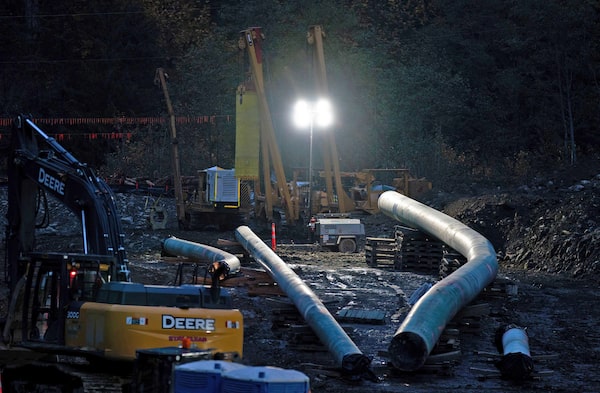
Construction of the Trans Mountain Pipeline near Hope, B.C., on Oct. 18.JONATHAN HAYWARD/The Canadian Press
Prices for natural gas have spiked since devastating floods and mudslides in British Columbia forced Enbridge Inc. to restrict flows through a key pipeline.
Closings and limits on lines that transport fuel are one more headache in a supply-chain mess left by the disaster, which washed out highways, bridges and rail lines, leaving commodities and freight stuck with no way in or out east of B.C.’s most populated region.
Enbridge Inc., which runs the main natural gas pipeline linking the production regions of northeastern B.C. with the Lower Mainland, said on Thursday it has limited shipments as it begins to check the stability of the right-of-way in the affected area between Merritt and Hope.
Volume on the pipeline segment known as T-South was reduced to 1.4 billion cubic feet of gas a day, down from a seasonal average for that section of 1.5 billion to 1.8 billion.
“We are continuing to monitor and assess. Given adverse conditions and the effort required, that work may take several days,” Enbridge spokesperson Jesse Semko said in an e-mail.
With shipments restricted, wholesale natural gas prices have surged in the Lower Mainland. This could translate into higher costs for consumers if disruptions persist, although it would not show up on household bills this year because of the way regulated prices are set.
Trans Mountain Corp. said on Thursday that its oil pipeline, which extends to Burnaby, B.C., from Alberta, remains off line as crews assess whether it sustained any damage since record rains fell in the region early this week, flooding vast areas. Work on the pipeline’s $12.6-billion expansion has also been halted in the flooded region between Hope and Merritt.
The line is owned by the federal government and supplies about 90 per cent of the crude, refined and semi-refined products needed to fuel the Lower Mainland. But debris and washed-out roads and bridges are hampering efforts to assess the line in the Coquihalla River valley region, so the company has no timeline for when the 300,000-barrel-a-day pipeline will resume shipments.
The Trans Mountain pipeline also provides the bulk of unrefined products to the Parkland Refinery in Burnaby, which supplies Chevron stations in the Lower Mainland. The refinery continues to operate, but the company is keeping a close eye on rail disruption and the Trans Mountain situation, Parkland spokesman Simon Scott said.
“For the time being, our inventory levels are where we want them to be,” he said. If necessary, the company can import fuel from the U.S. Pacific Northwest by tanker.
It is not clear yet if gasoline supplies could run short, and prices in the Vancouver area have yet to spike. They averaged just more than $1.60 a litre on Thursday, according to the petroleum refining and marketing consultancy Kalibrate, just a penny or two above last week.
Suncor Energy Inc. said on Thursday that while a few Petro-Canada locations have closed, and damage to roads has made it tough to service others, it is not experiencing any significant supply problems.
With the main natural gas pipeline running at reduced rates, the day-ahead wholesale price at the pipeline hub at Sumas, Wash., and Huntingdon, B.C., surged by 35 per cent on Wednesday to $7.39 a million British thermal units, according to data supplied by Stifel FirstEnergy. That compared with a $4.24 average for the fourth quarter of last year.
Prices were already forecast to surge this winter as gas producers struggle to boost supplies after a reduction in drilling activity in 2020, when the pandemic sapped demand for fuels. Southern B.C. faces the potential for even higher prices, but only if shipments remain restricted.
“As long as they can confirm there’s been no land movement around the pipe itself, or there’s no damage to the pipe, I suspect this will all be back up in, certainly, less than a week,” said Martin King, an analyst with RBN Energy.
Before the disaster, more than 1.1 billion cubic feet a day of the gas from the pipeline was being exported to the United States. The remainder flows north to Vancouver and along the coast on utility Fortis BC’s system. From there, the pipeline crosses the Strait of Georgia to supply Vancouver Island.
That part of the network currently has no supply disruptions, said Diana Sorace, a spokesperson for Fortis BC.
“Our priority is to provide the gas that our customers need first and foremost, but we also have the ability to draw from natural gas storage. That’s where we would go first if there were further restrictions on that T-South line,” Ms. Sorace said.
Any jump in the wholesale gas price won’t be reflected in consumer bills at least until next spring, which is the next time the British Columbia Utilities Commission reviews the company’s rates, she said.
Your time is valuable. Have the Top Business Headlines newsletter conveniently delivered to your inbox in the morning or evening. Sign up today.
 Emma Graney
Emma Graney Jeffrey Jones
Jeffrey Jones